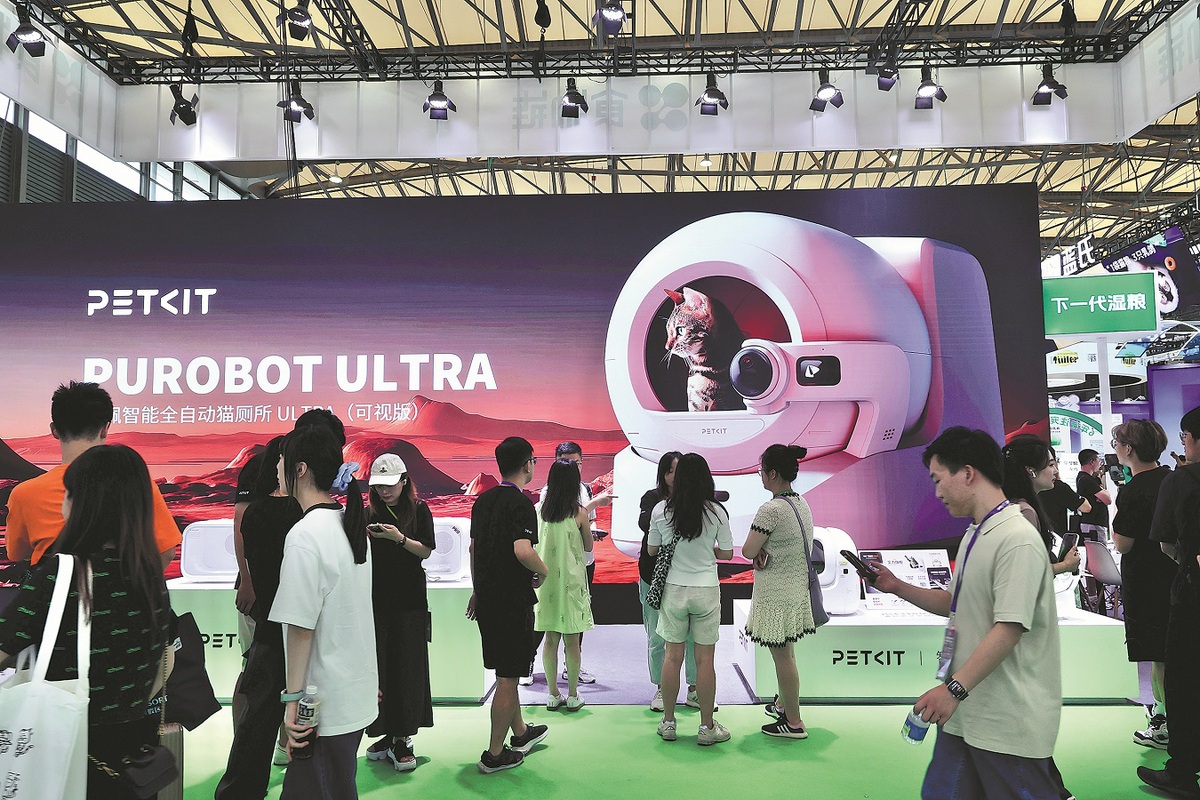Smart tech turns pet industry into gold mine
Pet owners increasingly looking for quality, personalization, and emotional touch to sustain lifestyle's newest demands


On a typical morning in Beijing, Jiang Nan, a 35-year-old tech-savvy cat owner, doesn't worry about feeding or cleaning up after his three feline companions. A smart feeder dispenses measured meals on a schedule. A pet water fountain filters drinking water 24/7. An automatic cat litter box not only detects when the cats relieve themselves and then cleans the waste, but also logs subtle weight changes.
"For me, raising cats is not just joyful — it's easy," Jiang said. "Even when I'm on a business trip, everything is taken care of. My cats live a happy life, and so do I."
Jiang's lifestyle is a snapshot of a wider revolution sweeping across China's burgeoning pet economy, where smart hardware, AI-powered solutions, and digital pet care services are transforming how people care for their pets. What began as a hobby for retirees in flower-and-bird markets has evolved into a tech-driven, emotionally connected, and data-rich industry dominated by younger urbanites.
According to the 2025 Chinese Pet Industry White Paper by Petdata.cn, a platform specializing in China's pet industry, the market size of China's urban pet (dog and cat) consumption rose by 7.5 percent to 300.2 billion yuan ($2.09 billion) in 2024.
The total pet population climbed to 124.11 million, up 2.1 percent from 2023, with cats growing faster than dogs — a 2.5 percent rise versus 1.6 percent growth.
Behind the boom is a generational shift. While post-1990s pet owners still make up the majority at 41.2 percent, their share has declined, giving way to a sharp rise among post-2000s, who now account for 25.6 percent of pet owners, up 15.5 percentage points year-on-year. Those young generations, often busy professionals, increasingly turn to smart pet devices for convenience, emotional reassurance, and health insights.
"Pet ownership naturally evolves in two phases," said Guo Weixue, cofounder and CEO of Petkit Network Technology Co Ltd, a Shanghai-based designer and producer of smart pet products. "First, you see your pet as a cute baby. But soon enough, health becomes the core concern, especially as your pets face illness and aging."
Petkit's rise mirrors the wave of pet tech. Last year, the company reported revenue of around 1.1 billion yuan, with over 90 percent coming from three main categories: smart litter boxes, feeders, and water fountains — the essential trio for daily care.
Notably, nearly half of the company's sales are exports, with products now sold in more than 40 countries and regions, including Europe, the United States, Japan, South Korea, and Southeast Asia. Globally, Petkit's connected app has over 5 million users, many of whom are paid subscribers to additional services such as high-definition video playback for pets.
The company's vision goes beyond automation. Petkit is working to turn every pet's home into a fully integrated health system, where devices not only feed and clean but also monitor vital signs in real time.
"Our latest AI-powered cat litter boxes detect abnormalities in the frequency and composition of urine and feces," Guo said. "For example, if a cat that normally urinates six times a day suddenly jumps to 12, that's a red flag for urinary tract issues. Early intervention with inexpensive supplements — costing just 20 to 50 yuan — can prevent serious, painful complications down the line."
To pinpoint which cat among several is unwell, the system employs facial recognition. Petkit urine monitor cat litter can change color to pinpoint potential illness early. For instance, it reacts to urine acidity, hidden blood, or sugar levels, indicating conditions such as kidney stones, infections, or even diabetes.




































